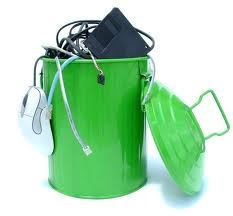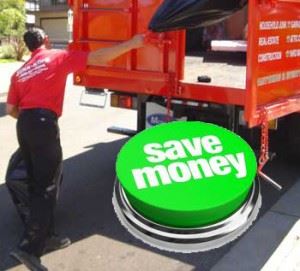 Sugar from garbage? Sounds too wacky to be believed but that is actually the goal of the Houston based Waste Management Company as they enter into a new partnership with Renmatix Inc. They want to explore processing urban waste such as recyclables, food scraps, construction debris, pulp and paper waste into renewable chemicals and fuels. One of those chemical compounds could be a synthetic sugar.
Sugar from garbage? Sounds too wacky to be believed but that is actually the goal of the Houston based Waste Management Company as they enter into a new partnership with Renmatix Inc. They want to explore processing urban waste such as recyclables, food scraps, construction debris, pulp and paper waste into renewable chemicals and fuels. One of those chemical compounds could be a synthetic sugar.
“This collaboration is a continuation of our commitment to extract the value we see in waste and convert it into valuable resources,” said William Caesar, president of Waste Management Recycling Services, in a new release. “We are working with Renmatix to further scale its technology, which has quickly emerged as the lowest-cost conversion method for producing the bio-based sugar intermediates demanded by global markets.”
This kind of innovation is at the heart of any recycling program. Recycling is all about repurposing and reusing. That means breaking down an item to its original chemical compounds. It’s easy to recycle paper. You just have to grind up the old paper and make it into a mush. Then you wash the mush and reform it into a new roll and it’s ready to go. Paper isn’t complex which makes it top of the list of recyclable materials. It’s when you get into things like e-waste where the recycling becomes a bit more challenging.
E-waste or electronic waste is best described as an item that needs power to operate. Does that make an old fan e-waste? Technically yes but more often it refers to things like computers, monitors, fax machines, copiers and television. Of course all the cables, keyboards and “mice” used in support of all of that is also consider e-waste. Throwing this out in the garbage isn’t an option. There are too many potentially harmful components in some of those items that should not be mixed in the “soup” of a landfill.
Recycling e-waste is about disassembling those pieces. Within every computer or TV are components that then have to be separated and broken down. Only then can those piles of items be truly recycled. In the grand scheme of things you really don’t have to worry about that process. All you really need to concern yourself with is getting your e-waste to the right recycling facility. That’s where Junk King Houston comes into play.
Junk King is the professional junk removal business based here in Houston who specializes in this kind of pick-up and drop-off. On the pick-up side, you’ll make arrangements for Junk King to come by your place to assess how much junk you want removed. You don’t just have to toss out a single old TV or fax machine. You can get rid of furniture, yard waste, car parts or anything else that won’t fit into your garbage can. After Junk King Houston completes the pick-up, they’ll do the drop off at the closest recycling center. It’s truly the best way to get any junk out of your life once and for all!
 Text Us
Text Us




 There are some new arrivals at the Houston Zoo that has everyone buzzing. A baby Masai Giraffe was born on July 14th. Consider these facts: This was a 14 month long pregnancy, normal for giraffes. Right out of the gate this baby weighed 160 pounds and was already 74 inches tall. That’s some baby! This little long necked cutie wasn’t the only new arrival to show up at the zoo. There have also been new monkeys, turtles, toads, geckos and a lemur who made their first steps in the world. It’s certainly an exciting time to be around the zoo these days. With all of these new arrivals there has to be room made to accommodate the growing families.
There are some new arrivals at the Houston Zoo that has everyone buzzing. A baby Masai Giraffe was born on July 14th. Consider these facts: This was a 14 month long pregnancy, normal for giraffes. Right out of the gate this baby weighed 160 pounds and was already 74 inches tall. That’s some baby! This little long necked cutie wasn’t the only new arrival to show up at the zoo. There have also been new monkeys, turtles, toads, geckos and a lemur who made their first steps in the world. It’s certainly an exciting time to be around the zoo these days. With all of these new arrivals there has to be room made to accommodate the growing families. As a real estate agent in Houston you might have had the unfortunate experience of taking on a listing from the bank that was once occupied by squatters. In this era of foreclosed properties, the concept of squatters taking over has become more prevalent. Ironically, the cops can’t do a lot when it comes to enforcing the laws. Technically, a squatter is guilty of trespassing but unless the property owner is pressing charges the police can’t arrest them. Since the foreclosed home is owned by a bank, it’s hard to track down a single person who can be legitimately called the owner. Yes, a bank can begin eviction proceedings but during that time, the squatters have no problem staying put. You probably don’t have to imagine the horrors of what could go on in a home turned into a squatter’s den because you’ve seen the aftermath. Now there is help standing by and that would be
As a real estate agent in Houston you might have had the unfortunate experience of taking on a listing from the bank that was once occupied by squatters. In this era of foreclosed properties, the concept of squatters taking over has become more prevalent. Ironically, the cops can’t do a lot when it comes to enforcing the laws. Technically, a squatter is guilty of trespassing but unless the property owner is pressing charges the police can’t arrest them. Since the foreclosed home is owned by a bank, it’s hard to track down a single person who can be legitimately called the owner. Yes, a bank can begin eviction proceedings but during that time, the squatters have no problem staying put. You probably don’t have to imagine the horrors of what could go on in a home turned into a squatter’s den because you’ve seen the aftermath. Now there is help standing by and that would be 